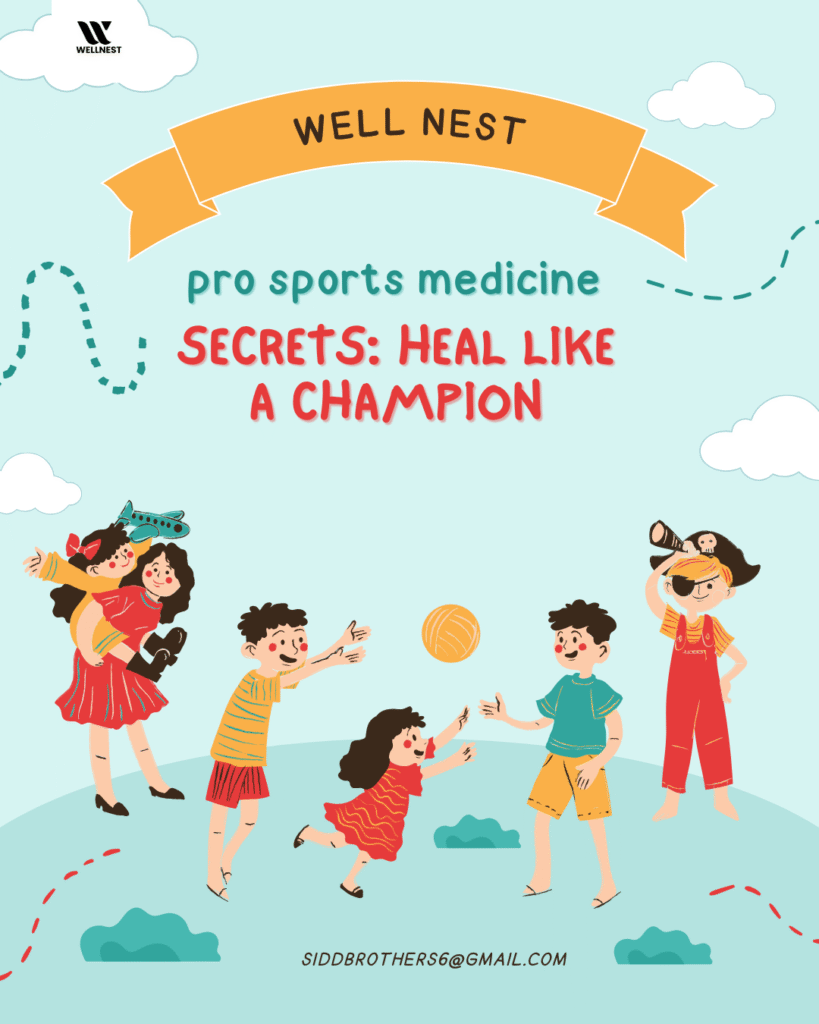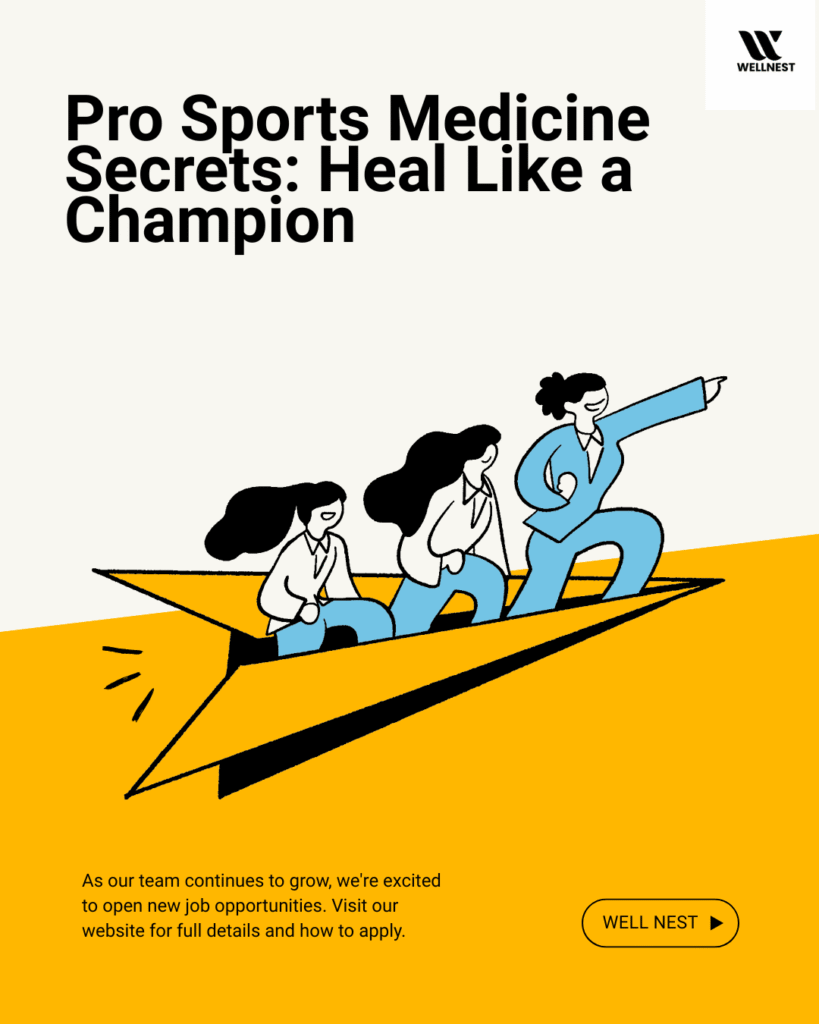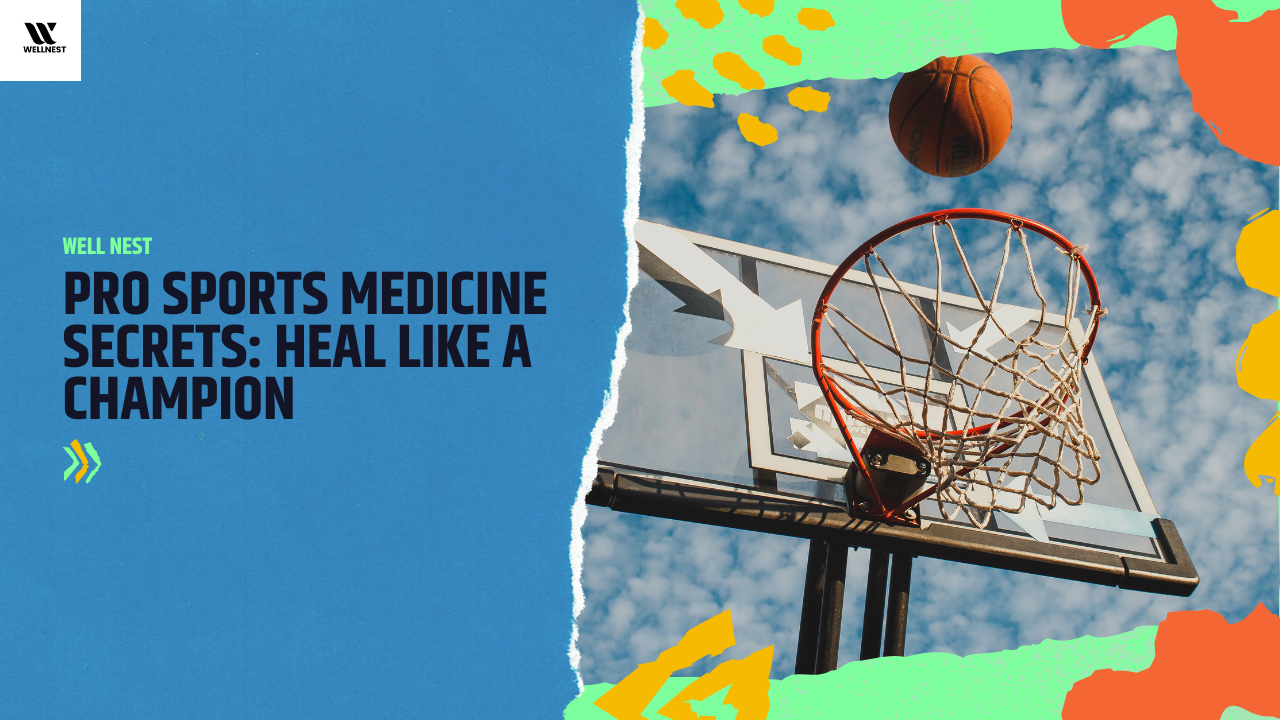Whether your an active weekend warrior a high caliber athlete or just someone looking to stay active without any pain, Pro Sports Medicine can be a game changer for you.
In this guide, we’re going to explore sports medicine and explain why it’s not just for the pros—and how you can benefit from it if you want to remain injury-free, recover faster, and be at your best.
What is Pro Sports Medicine After all?
When most people hear “sports medicine,” they think of Olympians or elite football players. But the reality is this: sports medicine is for all of us who use our bodies intentionally.
Pro Sports Medicine is the evidence-based, athlete-focused way to keep athletes in the game. It is even provides the best of orthopedics, physical therapy, nutrition, rehabilitation, and yes, mental health designed to help you train smarter and recover faster.
When I ripped my ACL playing pick-up basketball, I figured I was over. But after being treated by a sports medicine team, I returned stronger and smarter and more confident.” – Tom, age 38
The Basics of Pro Sports Medicine
Here’s what Pro Sports Medicine really consists of:
Injury Prevention
Fortunately, prevention is the backbone of smart training. Whether you’re preparing for HYROX, weightlifting, or simply making your way through the first 5k of your life — staying injury free is the name of game.
Key prevention strategies include:
Proper warm-ups and cool-downs
Movement screenings and assessments
Strength and conditioning programs
Nutrition to support tissue health
Monitoring training loads
Diagnosis and Imaging
One of the first steps after an injury is figuring out what’s happening. At clinics like those of Pro Sports Medicine, tools such as musculoskeletal ultrasound, MRI and physical exams help get to the problem.
Example: If you have persistent shoulder pain, a rapid musculoskeletal ultrasound can help determine whether it’s a rotator cuff tear, tendonitis or something else entirely.
Rehabilitation and Recovery
Here’s where the actual work takes place. From ACL tears to tendonitis, there is no one-size-fits-all fix for a knee injury.
Physiotherapy-led rehab
EMS to regain strength from Electrical Muscle Stimulation
Joint injections (steroid, or hyaluronic acid injected into the joints) for relief of inflammation
Related to work on the muscles and soft tissue:
“After I pulled my hamstring EMS got me back in touch with muscles that just didn’t seem to want to fire. It felt like magic.” – Sarah, CrossFit athlete

Nutrition Fueling the Healing Process in Sports Medicine
We also don’t realize how much nutrition plays a role in our ability to recover. But here’s a truth we can’t avoid: without the proper fuel, your body can’t heal the way it should.
Vital supplements and foods for recovery:
Vitamin C and collagen synthesis
Omega-3-fatty acids (to lower the inflammatioin)
Bone broth (yes, grandma’s advice is spot on!) for joint support
Protein for muscle repair
Creatine – more than a bodybuilder supplement; also useful in concussion recovery
P.S. New research suggests that creatine can even inhibit the severity, and duration, of concussions, which could be a game-changer for contact sport athletes.
The Evidence for Tendon Healing Society
The Science and Significance of Tendinopathy: Is it all down to Inflammation?
Tendons — the tough bands connecting muscle to bone that give runners and jumpers elastic spring, and players like HayfieldA something more esoteric — have poor blood flow. That’s why injuries like Achilles tendon rupture take longer to heal.
At Pro Sports Medicine, cutting-edge therapies help hurry things along:
Hyberbaric Oxgen / HBOT – Supply increased oxygen to tissue – Increases oxygen delivery to the tissues.
BPC-157 peptide – A compound found in human gastric juice, known to enhance tendon and ligament recovery
Percutaneous Achilles Repair System (PARS) – A LESS-INVASIVE OPTION.
Step-by-Step: What to Do When a Tendon Is Injured
Cease activities, it will just get worse.
If necessary, put ice on it – elevate, compress.
Schedule an appointment with a sports medicine doctor.
Get imaging (ultrasound or MRI).
Adhere to an individualized rehab protocol, progressive loading.
Throw in some nutritional support with collagen and Vitamin C.
Then try manual therapy or injections, if you are prescribed them.
Advanced Techniques in Sports Medicine
Electrical Muscle Stimulation (EMS)
Others rely on electric pulses to stimulate muscles. It’s great for:
Early rehab when you can’t move much
Rebuilding neural connections post-injury
Muscle hypertrophy in strength programs
Joint Injections: Get Back to Life in Short Order
Pro Sports Medicine Cardiff administers injections of either preferred – coolonomics.
Steroid injections: A fast way to ease pain and swelling.
Hyaluronic acid: Lubricates joints (commonly injected for knees and hips).
“I got a hip injection on Monday and by Thursday I was pain-free walking. Honestly, I was shocked.” – Chris, HYROX athlete
Hyperbaric Oxygen Therapy (HBOT)
Picture yourself walking into a chamber and taking a breath of pure oxygen. That’s HBOT. It’s been shown to:
Accelerate wound and tissue healing
Decrease inflammation
Enhance blood flow to tendons, ligaments and muscles
Biomechanics in Sports Medicine
Biomechanics is the science of movement. If you move wrong, you get hurt. Simple.
Using tools like:
Gait analysis
Motion capture
Force plate testing
Sports medicine pros can identify problems with your movement and correct them before they become injuries.
Example: A runner with shin splints could be overstriding. Months of pain can be solved with a slight tweak to running mechanics.

Real Talk: Do I Have to Be an Athlete to Visit a Sports Medicine Specialist?
Absolutely not.
Many patients are everyday people:
Office workers with back pain
New mamas experiencing hip instability
Weekend cyclists with knee issues
If you travel, you can take advantage of Pro Sports Medicine.
Local Spotlight: Pro Sports Medicine Cardiff Helps HYROX Athletes
Ifndef 0 inShare KEEPING VIEWERS IN THE KNOW People Explore Hijacking After New Zealand Mosque AttacksSpeculation over what led a man to commit two deadly shootings at two separate mosques never should have been the story.
Cardiff is rocking HYROX and Pro Sports Medicine are proud to be leading the charge on these hybrid athletes. There are even locals who rely on the clinic for training guidance, fitness counseling, injury treatment and performing enhancement.
From tackling your first HYROX or gunning for the podium, sports medicine can help keep you training smarter and finishing stronger.
The Mental Side of Recovery
Injuries are not only physical. They mess with your head too. That’s why the top sports medicine programs also provide:
Psychological support
Mindset coaching
Help managing expectations
And recovery from an injury is not only physical, but emotional. Having a conversation with someone who knows what you are going through can make all the difference.
Checklist: When you Should Visit a Sports Medicine Specialist
Use this list to know when it’s time to book a consult:
Ongoing soreness after you have trained
You have suffered a acute injury (it happened abruptly – twist, pop or tear)
You want to enhance sports performance
You’re trying to get back into the game after having some time off.
Rest hasn’t helped, so you’re still feeling off
You don’t know how to plan your training
If any of the above sounds familiar — do not wait. Early intervention = faster recovery.
What You Should Do to Find Out About Pro Sports Medicine Before You’re Left Behind
Here’s your quick-start roadmap:
Locate a respected clinic near you (such as Pro Sports Medicine Cardiff).
Request a Consultation – tell us about your injury, sport or specific goal.
Obtain a diagnosis with x-ray or movement tests.
If you can, work with a rehab team (physio, strength coach, nutritionist).
Stick to your treatment plan, exercises, diet and sleep.
Revaluate progress every 2–4 weeks and modify.
Last Thoughts: The New World Of Sports Medicine Is Proactive
People used to only go to the clinic once they got hurt.
Today, Pro Sports Medicine is shifting to proactive care – optimizing movement, preventing injuries, and building stronger, more resilient bodies from the start.
Whether you’re a seasoned competitor or just someone who loves staying active, sports medicine isn’t just for recovery—it’s for performance, longevity, and living pain-free.
